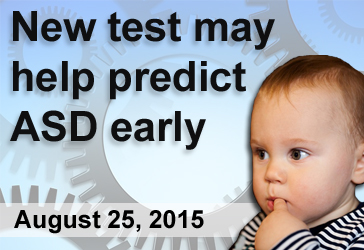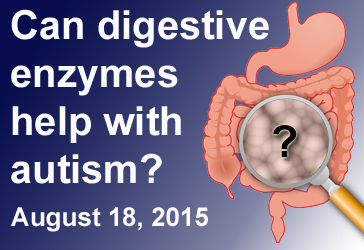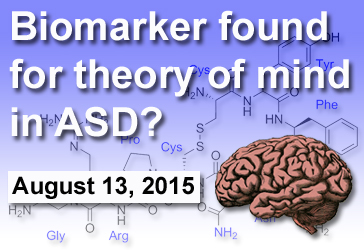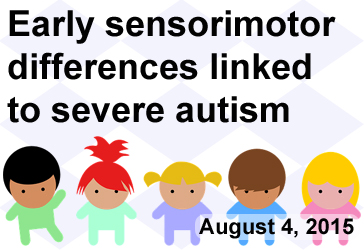Archives
August, 2015
Select a different month in the archive
Researchers Create Rapid ASD Screening for Toddlers
By Chelsea E. Toledo, M.A. on August 25, 2015

Background: Autism Spectrum Disorder (ASD) is typically diagnosed via behavioral observation of a child. The American Academy of Pediatrics currently recommends that children undergo a “level one” screening at their 18- and 24-month well visits. If that screening, which involves questions about a child’s communicative and social behaviors, raises a concern about ASD, the child is usually referred to a specialist who can conduct more formal assessments.
What’s New: On August 15, 2015, the Journal of Pediatrics published a study detailing a new screening tool for toddlers. The researchers administered the ten-minute, play-based test, called Rapid Interactive Screening Test for Autism in Toddlers (RITA-T) to a total of 61 toddlers, including 42 with developmental concerns established by a level one screening. RITA-T was 88 percent accurate in predicting the 23 ASD diagnoses ultimately made through formal diagnostic tests.
Why it’s important: RITA-T has the potential to become a useful “level two” screening tool for clinicians, helping to weed out the false positives generated by level one screenings and allowing for earlier diagnosis and intervention.
Help me understand :
| Source(s) : |
| Tweet |
Digestive Enzyme Supplement May Improve ASD Symptoms
By Shana R. Spindler, Ph.D. on August 18, 2015

Background: Gastrointestinal ailment is frequently observed in individuals with Autism Spectrum Disorder (ASD). Several studies have shown that individuals with ASD may lack proper digestive enzymes, such as lactase—an enzyme that helps digest the lactose in dairy products. One theory is that undigested nutrients may contribute to some of the core symptoms of autism and any co-occurring gastrointestinal distress.
What’s new: On August 31, 2015, the journal Clinical Psychopharmacology and Neuroscience published a randomized, double-blind, placebo-controlled study investigating the benefits of digestion enzyme supplementation for children with ASD. The researchers gave 92 children with ASD between 3 to 9 years of age either a combo of gastric enzymes (papain and pepsin) or a sugar syrup placebo, to be taken at each meal. After three months, the group receiving the enzymes showed significant improvement in emotional response, general behavior (mainly improved restrictive, repetitive, and stereotypic behavior), and gastrointestinal symptoms.
Why it’s important: This study supports the need for a larger, randomized, double-blind study of digestive enzymes for children with ASD. According to the authors, digestive enzymes are inexpensive, readily available, and safe for use.
Help me understand :
| Source(s) : |
| Tweet |
Level of Hormone Predicts Theory of Mind Ability in ASD
By Shana R. Spindler, Ph.D. on August 13, 2015

Background: Difficulty with social functions is a defining characteristic of Autism Spectrum Disorder (ASD). Hormones in the brain, such as oxytocin and arginine vasopressin, play an important role in regulating social behaviors in humans and other mammals. While several studies have focused on the potential role for oxytocin in the diagnosis and treatment of ASD, few investigations have centered on arginine vasopressin.
What’s new: On July 22, 2015, the online journal PLOS ONE published a study examining the relationship between blood levels of arginine vasopressin (AVP) and social abilities in those with ASD, their siblings, and neurotypical controls. The researchers first confirmed that blood levels of AVP predicted brain levels of the hormone. Next, they found that ASD individuals with lower blood levels of AVP have decreased Theory of Mind—the ability to interpret another’s intensions and emotions. This correlation is specific only to Theory of Mind ability, as AVP blood levels did not predict other social function scores.
Why it’s important: ASD is a heterogeneous condition—individuals along the spectrum have varying degrees and combinations of symptoms. Consequently, there is individual variability in Theory of Mind. Having a biomarker for this nearly universal feature of ASD will be important for diagnosis and treatment selection. This study suggests that the blood level of arginine vasopressin could be a biomarker for theory of mind ability in individuals with autism.
Help me understand :
| Source(s) : |
| Tweet |
Sensorimotor Differences in ASD Appear in Infancy
By Chelsea E. Toledo, M.A. on August 4, 2015

Background: In the United States, one in 68 children is estimated to have Autism Spectrum Disorder (ASD). Children who have an older sibling with the disorder face a much higher risk, which studies have estimated to be about one in 10. Researchers can study these infants and toddlers at high risk of ASD to learn about the early onset characteristics of autism.
What’s New: On July 16, 2015, The Journal of Neurodevelopmental Disorders published a study exploring differences in behavioral, cognitive, and adaptive development among infants at high and low risk of developing ASD. The researchers performed established screenings to assess the behavior of 308 children—210 of whom were high-risk and 98 of whom were low risk for ASD—at 6, 12 and 24 months of age. They classified 49 of the high-risk children as having ASD at 24 months, with the children who most closely matched the profile demonstrating sensorimotor deficits at 6 months of age. In contrast, the less severely affected children displayed their first differences in the form of socio-communication skills by two years of age.
Why it’s important: Previous studies on infants have revealed differences first appearing in social and communicative abilities. This finding—that children most severely affected by ASD have early sensorimotor difficulties—could reveal some of the physiological basis for the disorder, leading to earlier diagnosis and intervention.
Help me understand :
| Source(s) : |
| Tweet |

